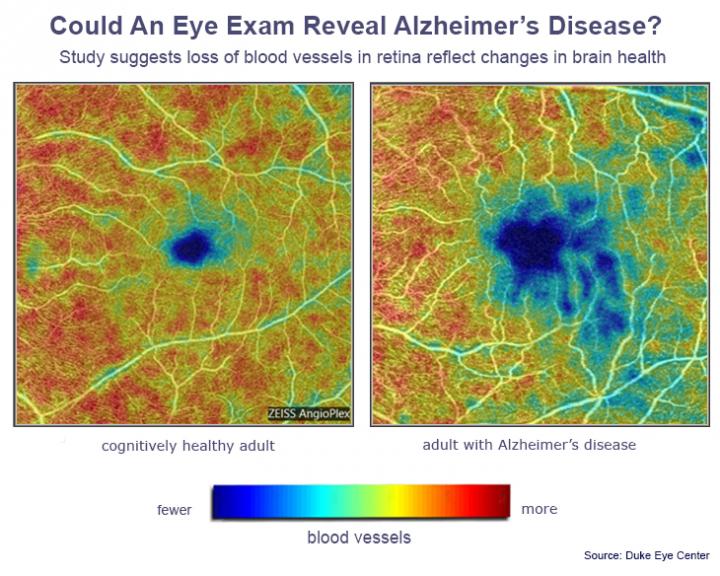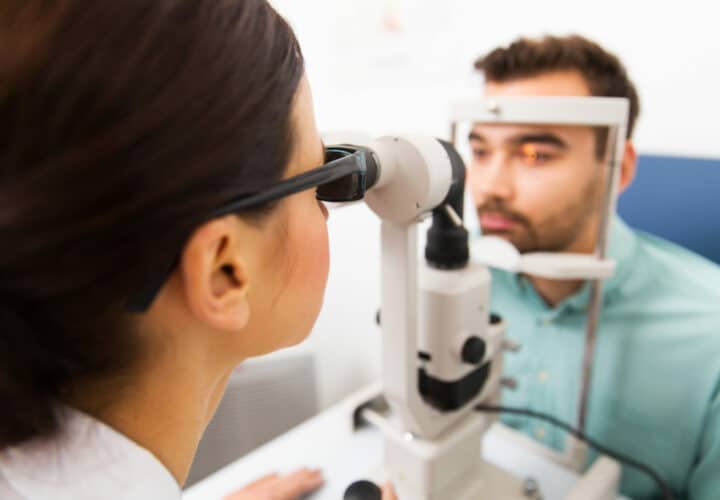Most people get a yearly eye exam to test their vision and look for signs of degeneration and even diabetes, brain tumors and high cholesterol. But now, a new test could add another preventative screening to your exam: Alzheimer’s.
Where Alzheimer’s Shows Up in the Eye
Researchers from Boston Medical Center were able to see levels of the proteins, beta-amyloid and tau, that accumulate in toxic levels in the brains of people with Alzheimer’s by looking into study participants’ eyes. In brains affected by Alzheimer’s disease, those proteins form into plaques and tangles and cause neuron death, leading to symptoms like memory loss. But the accumulation of those proteins starts decades before symptoms are noticeable. The study, published in the Journal of Alzheimer’s Disease, connected those protein biomarkers to mental status, marking the eyes as a potential easy, quick and cheap diagnostic tool for Alzheimer’s.
Currently, Alzheimer’s is typically only diagnosed in death once a brain can be examined for the telltale signs during an autopsy. Patients can get a cerebrospinal fluid test or a PET scan to look for the proteins and confirm a diagnosis, but those tests are expensive, invasive, and are not covered by insurance because Alzheimer’s has no effective treatment.
Alzheimer’s Proteins Found in Eye Fluid
For this study, researchers analyzed the eye fluid of 80 patients scheduled to undergo eye surgery. They tested the fluid for the protein markers, then compared those levels to results of a baseline cognitive test. Levels of the proteins were associated with lower cognitive scores among the patients.
“These findings could help us build an accessible and minimally invasive test to determine Alzheimer’s disease risk, especially among patients with eye disease,” says Lauren Wright, MD, first author on the study and ophthalmology fellow at BMC. “We noted that some of the participants who had low levels of protein biomarkers in their eye fluid already had signs of mild to moderate dementia based on their cognitive scores.”
Why a Test That Can Detect Alzheimer’s Early, Cheaply and Effectively Is Necessary
In order to potentially stop Alzheimer’s, researchers now believe that a therapy would need to be delivered to the brain in the early stages of the disease, before symptoms present. An eye diagnostic tool like this one would help identify patients who could most benefit from a clinical trial or potential drug when one is available. They could also start making lifestyle changes associated with a lower risk of developing Alzheimer’s.
“This is a great step in discovering the eye’s potential role in diagnosing preclinical Alzheimer’s disease, and further study is needed comparing protein biomarkers in the eye with more in-depth neurological testing,” adds Manju Subramanian, M.D., senior author, principal investigator and ophthalmologist at BMC.
Alzheimer’s Also Presents in Blood Vessels
Last week, a study of over 200 people by the Duke Eye Center found that cognitive differences pointing to dementia can also show up in the density of blood vessels in the eyes.

“In people with healthy brains, microscopic blood vessels form a dense web at the back of the eye inside the retina, as seen in 133 participants in a control group,” researchers said in a press release. But for the 39 participants with Alzheimer’s, the web of blood vessels was more sparse.
“We’re measuring blood vessels that can’t be seen during a regular eye exam and we’re doing that with relatively new noninvasive technology that takes high-resolution images of very small blood vessels within the retina in just a few minutes,” said Duke ophthalmologist and retinal surgeon Sharon Fekrat, M.D., the study’s senior author. “It’s possible that these changes in blood vessel density in the retina could mirror what’s going on in the tiny blood vessels in the brain, perhaps before we are able to detect any changes in cognition.”
Like the eye fluid study, the Duke study would be used to identify Alzheimer’s before symptoms begin.
“Ultimately, the goal would be to use this technology to detect Alzheimer’s early, before symptoms of memory loss are evident, and be able to monitor these changes over time in participants of clinical trials studying new Alzheimer’s treatments,” Fekrat said.
[ Next: Protein Found in Blood Test Could Predict Alzheimer’s 16 Years Earlier ]




My mom has been avoiding getting an eye test for a few years and now that I found this article, I can share the benefits of eye exams with her! It makes a lot of sense that eye exams give clues about dementia and Alzheimers. The fact that regular exams would help my mom to catch this disease in the early onsight phase would help her to cope and fight it better.
My parents are getting older, so I wondered if I could do anything to keep them healthy. I didn’t know the typical way of diagnosing Alzheimer’s is during an autopsy. If continuing to take my parents to get their eyes checked can help reduce the chances of them getting Alzheimer’s, I’ll make the investment! I’ll have to look into ophthalmology services that could help them out.
I liked that you mentioned an eye exam could help you to diagnose mental problems, such as Alzheimer. My husband and I are looking for information about the benefits of regular eye exams, and we found this information really helpful. I will schedule an eye exam as soon as possible to see if there is anything wrong.
Had I not gotten a copy of my medical records after a small surgery, I would have never known that the anesthesiologist that only spoke to me before the surgery for 30 seconds diagnosed me with mild dementia. Check your medical records and ask questions!